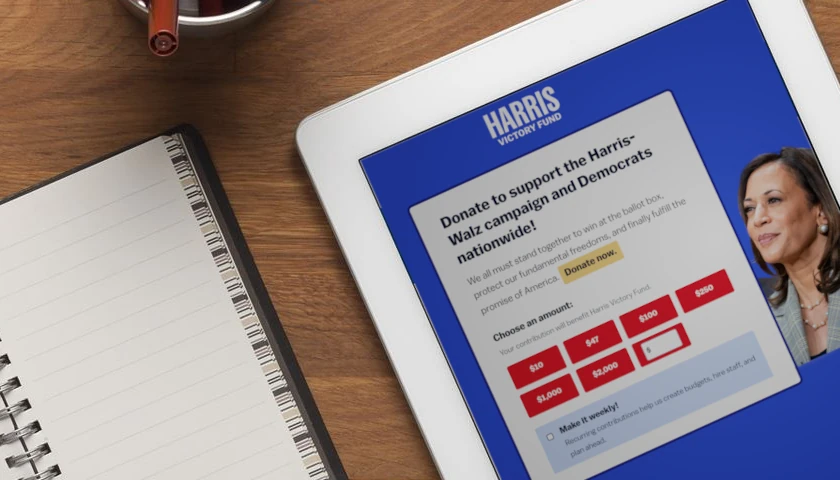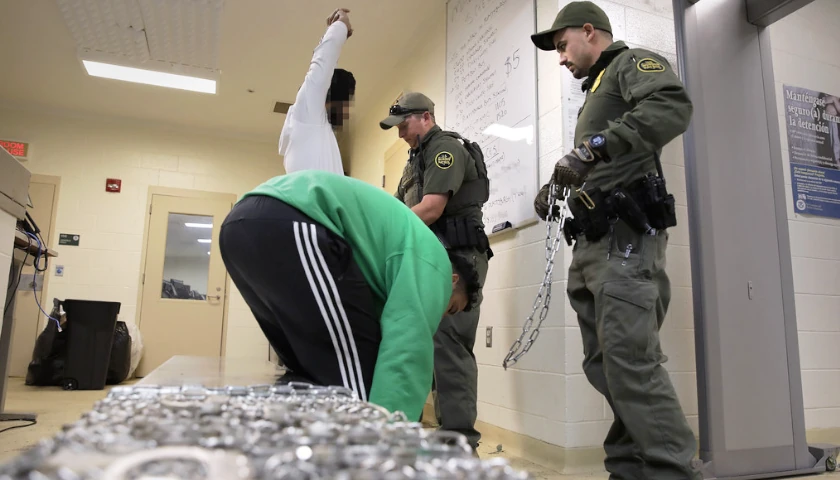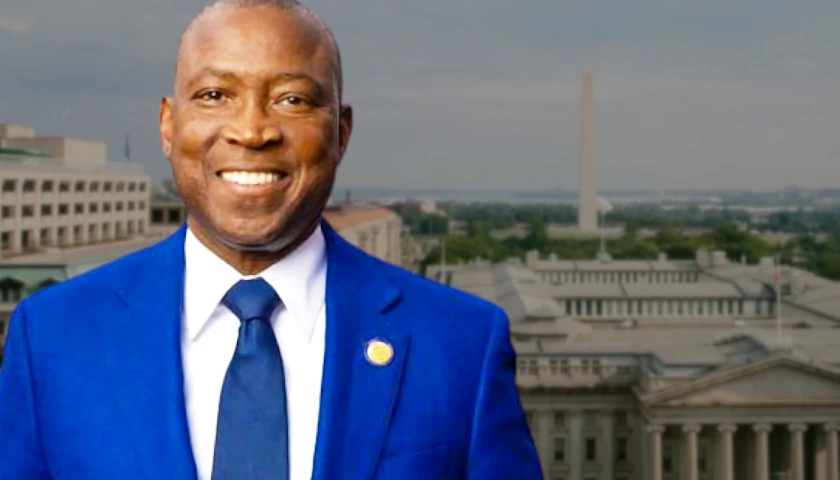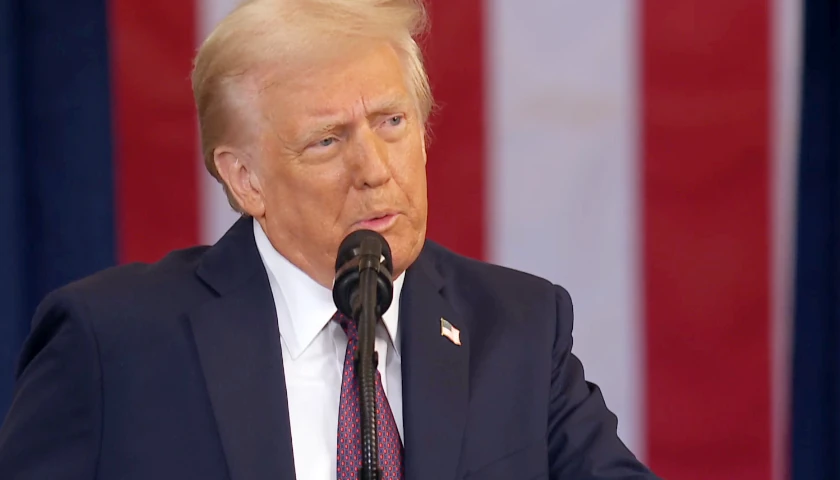by Natalia Mittelstadt and John Solomon
A sprawling investigation into the online fundraising platform ActBlue has expanded into 19 states, as attorneys general across the country press the company on its security practices and whether Democrats might be using the platform to cheat on election donations.
An investigation that began with a few states and a House committee has now spread across nearly half the country as chief state investigators are endeavoring to determine whether Democrats have used the ActBlue to launder foreign money or craft donations in people’s names without their permission, a practice known as “straw donations.”
In a letter sent last week to ActBlue CEO and President Regina Wallace-Jones, the state attorneys general highlighted potential security issues with the online fundraising platform that could be allowing donations made in people’s names who didn’t donate.
“Recent reporting suggests that that [sic] there may be donors across the country who are identified in filings with the Federal Election Commission as having donated to candidates through ActBlue (and other affiliated entities), but who did not actually make those donations,” the attorneys general wrote.
“Smurfing”
“That raises a host of concerns about whether ActBlue’s platform is being used to facilitate ‘smurfing’––a type of money laundering in which donors break up large donations and submit them under different names to disguise who the money comes from and thereby skirt contribution limits in violation of state and federal law,” the letter continued.
“Independent investigations have shown that there are donors across the country who show up on FEC filings as having donated to candidates through ActBlue (and other affiliated entities) but deny having made those donations. Given the prominent role it plays in our elections, it is incumbent on ActBlue to address the serious questions created by apparent irregularities in ActBlue’s FEC filings,” the attorneys general added.
“ActBlue is one of the largest fundraising platforms for election-related donations. Already during the 2024 election cycle ActBlue has raised billions of dollars. But there are concerns about where those dollars came from. It is essential that we know whether political donations—particularly in such large volumes—are being solicited, made, and processed consistent with campaign finance, consumer protection, and other state and federal laws.”
ActBlue has denied any wrongdoing but said it is cooperating with investigators.
The letter from the attorneys general comes as other investigations are developing on both the civil and criminal side. Just the News has confirmed some Americans who believe their names have been misused to make donations for others are contemplating a private lawsuit while Congress is trying to determine whether federally regulating financial institutions have reported any suspicious transactions flowing through ActBlue’s platform or its clients.
Security protocols
The states’ top law enforcement officials asked Wallace-Jones to verify ActBlue’s security protocols and ensure that donors are who they claim to be.
The state attorneys general for Iowa and Indiana led the letter, which also included attorneys general from Alabama, Arkansas, Florida, Idaho, Kansas, Mississippi, Missouri, Montana, Nebraska, North Dakota, Oklahoma, South Carolina, South Dakota, Utah, Virginia, West Virginia, and Wyoming. The attorneys general asked Wallace-Jones to respond by Oct. 23.
Following the release of the letter, an ActBlue spokesperson told The Des Moines Register that it has been a trusted digital fundraising platform for the last two decades and legally contributes donations to candidates and organizations.
“We rigorously protect donors’ information by maintaining a robust security program and strict fraud prevention measures — often beyond what is required by law,” the spokesperson’s statement said. “We are aware of recent attempts to spread misinformation about our platform. Facts are essential so that voters and donors are not misled. For accurate information, please visit actblue.com.”
Amid his investigation into ActBlue, House Administration Committee Chairman Bryan Steil, R-Wis., made referrals last month to the attorneys general in Arkansas, Missouri, Texas, Virginia, and Florida regarding the fundraising platform. Steil said a massive computer analysis conducted by his committee uncovered a suspicious pattern of donations from individuals with net worths too small to donate what has been credited to them via ActBlue reports to the Federal Election Commission.
“This investigation focused on potential unlawful exploitation of unwitting ‘straw donors,’ whose identities may have been used to channel illicit funds into campaigns in your state,” Steil wrote to the state officials.
“The final analysis produced a set of anomalous donor profiles, ranked by the severity of the inconsistencies. In reviewing this analysis, it became clear there is suspicious activity occurring that warrants further review,” he added.
“Straw donors” are donors who are either given money by others to donate to federal candidates or whose identity is misused by others to make donations to evade federal campaign contribution limits.
Last December, Texas Attorney General Ken Paxton (R) opened an investigation into ActBlue after alleging that the organization was conducting fraudulent activity regarding donations. In August of this year, Virginia Attorney General Jason Miyares (R) also demanded answers from ActBlue after allegations of fraud were impacting Virginia.
In August, Paxton announced he reached an agreement in which ActBlue would begin using CVV codes when accepting all donations. CVVs are the three-digit security number on the back of credit and debit cards, and are key security provisions for preventing fraud.
Steil has been pushing H.R. 9488, called the SHIELD Act, which would require the disclosure of the card verification value and increase safeguards for online campaign donations.
The legislation also prohibits “aiding or abetting” making campaign contributions in the name of someone else.
Steil told the “Just the News, No Noise” TV show in August, “The real big concern here is that because these donations are made online, they could be coming from anywhere across the globe. Gone are the days where individuals would engage in illegal behavior with cash. Now we can do this online.
“My concern is that individuals are outside the jurisdiction of the United States who may be engaged in this,” he added.
– – –
Natalia Mittelstadt is a reporter at Just the News. John Solomon is an award-winning investigative journalist, author and digital media entrepreneur who serves as Chief Executive Officer and Editor in Chief of Just the News. Before founding Just the News, Solomon played key reporting and executive roles at some of America’s most important journalism institutions, such as The Associated Press, The Washington Post, The Washington Times, Newsweek, The Daily Beast and The Hill.
Photo “ActBlue App” by Act Blue.




